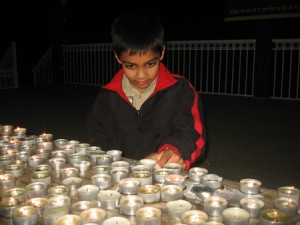Articles/Opinion » Over Seas » Sikh Genocide 1984
Memories of 1984 Sikh Genocide and Denial of Justice continue to traumatize and infuriate
November 7, 2010 | By Sikh Siyasat Bureau
“They threw kerosene gas on me and started to punch my body. … They wanted me to go outside the gate and then suddenly someone started a big fire outside. … If we had gone outside we would have died.”
The issue that was so traumatizing for Gian Singh is how Sikhs were singled out and were not even safe in their own country.
 For Shalinder Gill of Vancouver (see first photo), as he lit a candle at the vigil last Saturday at Dashmesh Darbar Gurdwara, 1984 evoked childhood memories of black smoke, noise, his mother giving out blankets and the tears of a woman in a gurdwara as she scrambled to save pieces of the Guru Granth Sahib.
For Shalinder Gill of Vancouver (see first photo), as he lit a candle at the vigil last Saturday at Dashmesh Darbar Gurdwara, 1984 evoked childhood memories of black smoke, noise, his mother giving out blankets and the tears of a woman in a gurdwara as she scrambled to save pieces of the Guru Granth Sahib.
Then there are the memories of a Sikh youth in Punjab, son of a well known martyr of 1984 (I have chosen to keep this name anonymous), thinking about his father’s sacrifices in connection to 1984. He told me this week from Punjab: “People are speaking even more this year about 1984 and the songs dedicated to 1984 are very popular and keeping the memory alive, in particular the song: “Asi Fan Han Yaaro Bhindran Wale Babe De.”
When I asked him how some of the Sikh youth are feeling in his village about 1984, he said: “Here the Sikh youth have all the anger inside, some have it buried deep inside and some have it alive.”
Meanwhile in Punjab, President of the Sikh Student Federation, Parmjeet Singh Gazi, told me on Wednesday morning: “People of Punjab have responded positively to the shutdown, approving the cause behind it. Sikhs feel betrayed by the state, as it has failed to deliver justice to the victims of Sikh Genocide of 1984.”
 Indeed, the collage of memories continue into the present day and commemoration of 1984 matters for Sikhs and non-Sikhs who not only oppose state violence with impunity but are continuing to resist and expose what some interpret to be deflection tactics employed by the Indian Government in India to eclipse the history of 1984. Most disturbingly is when political and / or community leaders attempt to down play, silence or politicize the 1984 atrocities which has the intended or unintended effect of distorting the facts of 1984. What is wrong with academics or human rights activists exposing this Sikh chapter of history to educate the next generation and to prevent further atrocities from reoccurring?
Indeed, the collage of memories continue into the present day and commemoration of 1984 matters for Sikhs and non-Sikhs who not only oppose state violence with impunity but are continuing to resist and expose what some interpret to be deflection tactics employed by the Indian Government in India to eclipse the history of 1984. Most disturbingly is when political and / or community leaders attempt to down play, silence or politicize the 1984 atrocities which has the intended or unintended effect of distorting the facts of 1984. What is wrong with academics or human rights activists exposing this Sikh chapter of history to educate the next generation and to prevent further atrocities from reoccurring?
In closing, when others speak out and educate, it empowers and unites people. It gives meaning and so the flames of 1984 and the bodies burned to ashes do come alive again in memory and continue to unfold in the present only to influence the future in a new way.
– Indira Prahst
Sociologist, Vancouver.
To Get Sikh Siyasat News Alerts via WhatsApp:
(1) Save Our WhatsApp Number 0091-855-606-7689 to your phone contacts; and
(2) Send us Your Name via WhatsApp. Click Here to Send WhatsApp Message Now.
Sikh Siyasat is on Telegram Now. Subscribe to our Telegram Channel
Related Topics: 1984 Sikh Genocide, Sikh Diaspora




